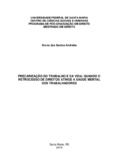| dc.creator | Andretta, Bruno dos Santos | |
| dc.date.accessioned | 2021-07-15T20:54:27Z | |
| dc.date.available | 2021-07-15T20:54:27Z | |
| dc.date.issued | 2019-08-26 | |
| dc.identifier.uri | http://repositorio.ufsm.br/handle/1/21512 | |
| dc.description.abstract | Labor has been suffering constant change throughout history, be it by advancing knowledge and technology, or by increasing competition in the world market as a whole. The level of demand, when it comes to productivity (directly proportional to labor intensity), is increasing, triggering a series of negative consequences for the worker. Therefore, going beyond physical harm, it is known that there are several psychosocial risks (many times invisible) that affect the working class. This scenario is excessively aggravated in the social context hit by the unmeasured neoliberal offensive. Thus, it is pressing to consider what relations and consequences can be pointed out between the precariousness of work, the impact on the mental health of workers, and the recent flexibilization of the judiciary system - being this the objective of the research. To this end, we sought to draw an overview of the precariousness of labor relations, with the understanding of the historical phenomena related to the organization of work, going through questions related to the role of the capital (through Toyotism) as an element that is closely connected to the psychism and consequent impacts on the mental health of the worker, as to, in a third moment, bring considerations about the current moment of legislative flexibilization of the diplomas related to work (especially Law No. 13,467/2017). The research was conducted through bibliographic and documental survey. The approach method used is the deductive one, establishing an interdisciplinary (and also dialectical) view between Law and other areas of knowledge. The procedure methods adopted are the historical and monographic ones, aiming at understanding the historical, social, and economic contexts, to then promote the necessary analysis and reflections on the legal context related to the theme. Finally, it is concluded that, yes, the recent changes in labor legislation, incorporated to the attacks of the socioeconomic context permeated by neoliberalism, have a direct and important impact on the already affected quality of life and mental well-being of the worker, demanding, above all, to establish the necessary effectiveness of decent work conceptions, human dignity, and sustainability. | eng |
| dc.language | por | por |
| dc.publisher | Universidade Federal de Santa Maria | por |
| dc.rights | Attribution-NonCommercial-NoDerivatives 4.0 International | * |
| dc.rights.uri | http://creativecommons.org/licenses/by-nc-nd/4.0/ | * |
| dc.subject | Direito do trabalho | por |
| dc.subject | Reforma trabalhista | por |
| dc.subject | Saúde mental do trabalhador | por |
| dc.subject | Sustentabilidade | por |
| dc.subject | Trabalho decente | por |
| dc.subject | Labor law | eng |
| dc.subject | Labor law reform | eng |
| dc.subject | Worker mental health | eng |
| dc.subject | Sustainability | eng |
| dc.subject | Decent work | eng |
| dc.title | Precarização do trabalho e da vida: quando o retrocesso de direitos atinge a saúde mental dos trabalhadores | por |
| dc.title.alternative | Life and labor precarizations: the worker's mental health hitted by retrocess of rights | eng |
| dc.type | Dissertação | por |
| dc.description.resumo | O trabalho vem sofrendo constantes mutações ao longo da história, seja pelo avanço do conhecimento e da tecnologia, seja pelo aumento da concorrência no mercado mundial como um todo. O nível de exigência, no tocante à produtividade (diretamente proporcional à intensidade do trabalho), é cada vez maior, desencadeando uma série de consequências negativas ao trabalhador. Logo, para além dos danos físicos, é sabida a existência de diversos riscos psicossociais (muitas vezes invisíveis) que atingem a classe trabalhadora. Esse cenário é agravado sobremaneira em contexto social atingido pela ofensiva neoliberal desmedida. Dessa forma, é premente ponderar sobre que relações e consequências podem ser apontadas entre a precarização do trabalho, o impacto na saúde mental dos trabalhadores e a recente flexibilização do ordenamento jurídico – sendo, esse, o objetivo da pesquisa. Para tanto, buscou-se traçar um panorama geral da precarização das relações laborais, com a compreensão dos fenômenos históricos relacionados à organização do trabalho, passando-se às questões relacionadas ao papel do capital (através do toyotismo) enquanto elemento que se conecta intimamente ao psiquismo e consequentes impactos à saúde mental do trabalhador, para, num terceiro momento, trazer considerações sobre o atual momento de flexibilização legislativa dos diplomas atinentes ao trabalho (sobretudo a Lei n. 13.467/2017). A pesquisa foi realizada através de levantamento bibliográfico e documental. O método de abordagem utilizado é o dedutivo, estabelecendo uma visão interdisciplinar (e também dialética) entre o Direito e outras áreas do conhecimento. Já os métodos de procedimento adotados são o histórico e o monográfico, visando compreender o contexto histórico, social e econômico, para, após, promover a necessária análise e reflexões sobre o contexto jurídico atinente ao tema. Por fim, concluiu-se que, sim, as recentes alterações na legislação trabalhista, coadunando-se aos ataques do contexto socioeconômico permeado pelo neoliberalismo, têm impacto direto e importante sobre as já afetadas qualidade de vida e bem estar mental do trabalhador, demandando, sobretudo, estabelecer a necessária efetividade das concepções de trabalho decente, dignidade humana e sustentabilidade. | por |
| dc.contributor.advisor1 | Silva, Maria Beatriz Oliveira da | |
| dc.contributor.advisor1Lattes | http://lattes.cnpq.br/9250920062835623 | por |
| dc.contributor.referee1 | Weiller, Teresinha Heck | |
| dc.contributor.referee2 | Bernardes, Márcio de Souza | |
| dc.contributor.referee3 | Cezne, Andrea Nárriman | |
| dc.creator.Lattes | http://lattes.cnpq.br/0116479797974267 | por |
| dc.publisher.country | Brasil | por |
| dc.publisher.department | Direito | por |
| dc.publisher.initials | UFSM | por |
| dc.publisher.program | Programa de Pós-Graduação em Direito | por |
| dc.subject.cnpq | CNPQ::CIENCIAS SOCIAIS APLICADAS::DIREITO | por |
| dc.publisher.unidade | Centro de Ciências Sociais e Humanas | por |



